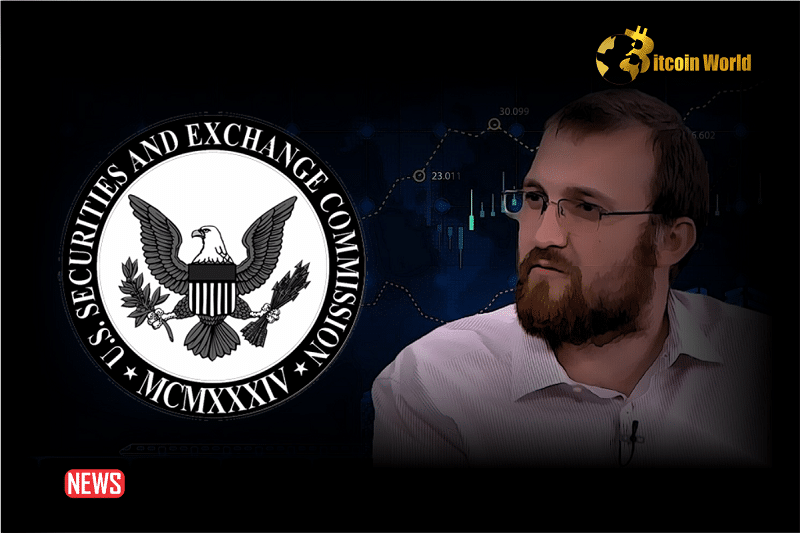Charles Hoskinson, the founder of Cardano, recently unleashed a fervent critique of the US Securities and Exchange Commission (SEC) and raised questions about Bitcoin’s decentralization in a candid AMA session.
The creator of Cardano, Charles Hoskinson, claims #Bitcoin is not decentralized and says it’s not fair that the SEC is going after crypto more broadly but not Bitcoin.
Bitcoin is anti fragile technology 🔥 pic.twitter.com/B9wuuvJIpd
— The ₿itcoin Therapist (@TheBTCTherapist) November 27, 2023
Hoskinson’s criticism was primarily aimed at the SEC’s approach to cryptocurrency regulation. He expressed confusion and frustration over how the SEC differentiates between cryptocurrencies like Ethereum, Bitcoin, and Cardano.
His challenge was not just rhetorical but also deeply rooted in the legal framework, specifically the Howey test, used to determine if an asset qualifies as a security.
He stated,
“Then they [the SEC] comes in and says it is a security. What the hell does this mean? If it is decentralized. How did Bitcoin register? It’s not. So explain to me the f****ng difference between Ethereum, Bitcoin, and Cardano, and the rest of the gang. Explain it to me. Like I’m five years old. Right now. Run the goddamn Howey test on it and show me the difference between the two. Tell me.”
A notable aspect of Hoskinson’s rant was his focus on Bitcoin’s decentralization and the expectation of profit from Bitcoin investments. He referred to Bitcoin enthusiasts as “orange pill moon boys,” suggesting there’s an inherent expectation of profit among them.
Read Also: Cardano Founder Shares What To Expect After Binance CEO’s Exit
“Is there an expectation of return with the goddamn orange pill moon boys, it’s there. There are so many different planks and angles that you can take a look from,” Hoskinson remarked.
This is significant because the expectation of profit is one of the four prongs of the Howey test, typically used to classify assets as securities.
Hoskinson further challenged the narrative of Bitcoin’s decentralization.
He argued that Bitcoin might not be as decentralized as widely believed, claiming, “if you subpoena about three different entities [the largest mining pools], you could perform a 51% attack on Bitcoin because that’s the way the hash power works. But it’s decentralized. And team orange gets a complete [free] pass. It’s a pathetic f*****g joke.”
In response to these assertions, Adam Back, CEO of Blockstream, defended Bitcoin’s decentralized status and its distinction from other cryptocurrencies.
@IOHK_Charles it's very simple: Bitcoin did not do an ICO, most people thought it had no value, it was mined from zero, it is decentralised, there is no CEO, ICO warchested "foundation", incorporation etc. so cardano, eth etc clearly pas howey, Bitcoin is a commodity and does not
— Adam Back (@adam3us) November 27, 2023
He emphasized that Bitcoin’s organic growth from zero value and lack of an initial coin offering (ICO) are key differentiators. “Bitcoin did not do an ICO, most people thought it had no value, it was mined from zero, it is decentralized, there is no CEO…,” Back argued, categorizing Bitcoin as a commodity in contrast to others like Ethereum and Cardano, which he views as securities.
Hoskinson countered these points by clarifying the nature of Cardano’s launch. He stated,
“There was no Cardano ICO. There was an airdrop onto a distribution […] A voucher sale of a different asset outside of the United States, priced in Yen, settled in Bitcoin, explained in Japanese to Japanese citizens, and without a single US participant does not constitute an ICO of Ada.”
Read Also: CardanoGPT Announces Beta Test Phase For Girolamo, An AI-powered Chatbot
Moreover, the discussion also veered into the technical realm with Erik Voorhees, CEO of ShapeShift, addressing Hoskinson’s claim about a possible 51% attack on Bitcoin. Voorhees debunked this idea as a common myth, explaining, “Common myth.
Common myth.
Pools don't *control* hashrate. They host it so long as they behave well, and if they don't, the hashrate can easily leave. https://t.co/Cvx5WO038G
— Erik Voorhees (@ErikVoorhees) November 27, 2023
Pools don’t *control* hashrate. They host it so long as they behave well, and if they don’t, the hashrate can easily leave.” This statement sheds light on the operational dynamics of Bitcoin mining pools and the decentralization of mining power, countering the centralization concerns raised by Hoskinson.














